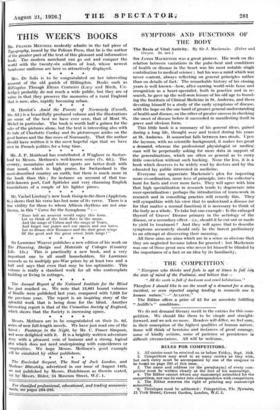-SYMPTOMS- AND FUNCTIO-NS OF THE BODY SIR JAMES MACKENZIE was
a great pioneer. His work on the relation between variations in the pulse-beat and conditions of health or disease in the heart was his most notable single contribution to medical science ; but his was a mind which was never content, always reflecting on general principles rather than on details of fact: The remarkable history of his closing. years is well known—how, after earning world-wide fame and recognition as a heart-specialist, both in practice and in re- search, he gave up the well-won leisure of his old age to found- ing the Institute of Clinical Medicine in St. Andrews, and there devoting himself to a study of the early symptoms of disease, with the hope on the one hand ofgreater general understanding of health and disease, on the other of greater success in checking the onset of disease before it succeeded in manifesting itself in grave and obvious form. • This little book is a summary of his general ideas, gained during a long life, thought over and tested during his years at St. Andrews. It:somewhat falls between two stools. Upon the layman, with no scientific background, it makes too great a demand, whereas the professional physiologist or medicai man will be perpetually asking for more data in support of the generalizations, which are often so general as to carry little conviction without such backing. None the less, it is a book which deserves to be widely read by doctors and by the educated lay public interested in medicine. , .
Everyone can appreciate Mackenzie's plea for importing more co-ordination, more love of principle, into the collector's hunt for facts and ever more facts. They will agree with him that high specialization in research tends to degenerate into over-specialization : perhaps the introduction of, team-work in research and in consulting practice .will remedy this. They will sympathize with his view that to understand a disease (or for that matter a normal function) it is necessary to think of the body as a whole.. To take but one example : Is the enlarged thyroid of Graves' Disease primary in the aetiology of the disease, or a secondary effect—i.e., should it be cut out or made to yield to treatment ? And they will agree that to describe symptoms accurately should only be the barest preliminary to an attempt at discovering their meaning.
All these aims are aims which arc in a sense so obyious that they are neglected because taken for granted : but Mackenzie was one of those great men whonever let himself be blinded to the importance of a fact or an idea by its familiarity. .


































 Previous page
Previous page